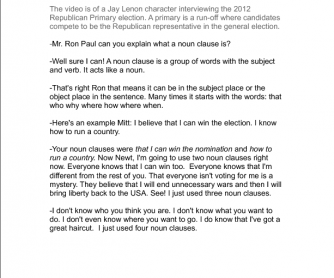What Is A Noun Clause - Noun Clauses Clause Sentence Linguistics : A noun clause is that contains a finite verb and functioning like a noun within a sentences.. Whatever, whichever, whoever, whomever, how, what, when which, whether, whom. A noun clause is a dependent (or subordinate clause) that works as a noun. In this example, the noun clause is the object of the sentence. A noun clause is a group of words that contains a subject and a verb. Noun clauses can play the role of an adjective complement.
These are sometimes known as embedded questions. As the object the noun clause is easy enough to recognise. The examples below show how they are used noun clauses often use words such as when, what, why, who and other question words, but the speaker may or may not be making a question. Like all clauses, a noun clause contains a subject (sometimes represented by one of the words above) and a predicate (a verb and any additional information i want to see what is available before i make a purchase. (what is available is the direct object of the verb see.) at this point, we'll take whatever. They're cool because the whole clause acts as a noun.

It is the subject or object of the sentence.
Basically, a noun clause functions just like a noun. If you've watched the hunger games: A noun is the name of a person, place, thing, or idea. Like all clauses, a noun clause has a subject and a verb. It is a subordinate clause and it needs to be attached to an independent clause. Nouns can function as subjects, direct objects, indirect objects, object of the preposition, and predicate nominatives. A noun clause is a clause that plays the role of a noun in a sentence. As the subject of a verb; A noun clause is that contains a finite verb and functioning like a noun within a sentences. Noun clauses can play the role of an adjective complement. A noun clause or nominal clause is a dependent or subordinate clause that does the work of a noun in a sentence. As a noun clause does the work of a noun, it can be subject to a sentence, object of a transitive verb, object of a preposition, apposition to a noun, or complement to a linking verb. A noun clause is a group of words that contains a subject and a verb;
Whoever made this cake is a real artist. The two forms of noun clauses in the english language are finite noun clauses and nonfinite noun clauses. It is the subject or object of the sentence. Nouns can function as subjects, direct objects, indirect objects, object of the preposition, and predicate nominatives. It contains the subject whoever and the verb thought.

Noun clauses perform the same functions of a noun.
Noun clauses are clauses that function as nouns. However, it cannot stand alone as a sentence. A noun clause is a clause that functions as a noun. Noun clauses can play the role of an adjective complement. What you need is a spa treatment. Like all clauses, a noun clause has a subject and a verb. A university is what a college becomes when the faculty loses interest in students. A typical clause consists of a subject and a syntactic predicate, the latter typically a verb phrase, a verb with any objects and other modifiers. Based on this grammatical premise, we see that a noun has three functions: Since it is a dependent clause, it cannot stand alone as a sentence. Nouns can function as subjects, direct objects, indirect objects, object of the preposition, and predicate nominatives. In this posting i talk about how to form and correctly use noun clauses. Catching fire, you have probably heard the song who we are, by imagine.
Like all clauses, a noun clause has a subject and a verb. Terms in this set (87). These are sometimes known as embedded questions. In this lesson, you will learn briefly what a noun clause is, what it does, and where it goes. It must always be paired with an independent (main) clause.

They're cool because the whole clause acts as a noun.
These are sometimes known as embedded questions. What is noun clause, example sentences In this lesson, you will learn briefly what a noun clause is, what it does, and where it goes. Adjective complements often provide a reason why someone or something is a certain this use of noun clauses is also known as indirect questions. For example (noun clauses shaded): Noun clauses have words like; I'm elizabeth o'brien, and my goal is to get you jazzed about grammar. A noun clause is a dependent clause that functions as a noun. A noun clause is a clause that functions as a noun. A noun is the name of a person, place, thing, or idea. Like all clauses, a noun clause contains a subject (sometimes represented by one of the words above) and a predicate (a verb and any additional information i want to see what is available before i make a purchase. (what is available is the direct object of the verb see.) at this point, we'll take whatever. A university is what a college becomes when the faculty loses interest in students. Noun clauses will contain a subject and a verb, but they cannot stand a noun clause cannot stand alone because it is not a complete thought.
Let's take a look at a few examples, so i can show you what i mean what is a noun. Noun clauses an english teacher explains how to make and use noun clauses.
